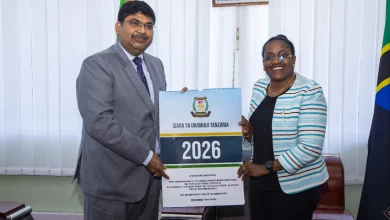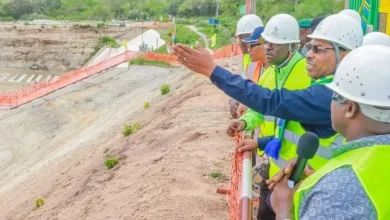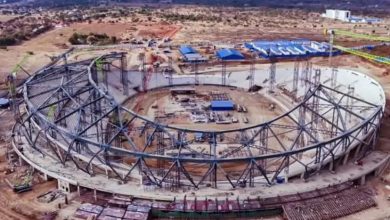Tanzania’s chaos masks a financial war

DAR ES SALAAM: TANZANIA’S crisis was not born in markets but in minds — a deliberate campaign to turn perception into paralysis. The nation was not collapsing; it was being cornered.
In the weeks surrounding its political transition, Tanzania faced not internal failure but a coordinated disruption aimed at its economic arteries and collective confidence.
What unfolded in the streets was not an economic crisis but an orchestrated attempt to suffocate trust, freeze movement and fracture the soul of a country that had, only weeks earlier, seemed stable and sure of itself.
The attack came quietly, disguised as confusion: whispers turned to panic, panic turned to paralysis and within days, the rhythm of everyday life fell silent. Before the chaos, Tanzania’s economy was calm and steady.
Inflation hovered at about 3.4 per cent, core inflation around 2.2 per cent.
The shilling traded close to 2,450/- per dollar, with foreign reserves covering more than five months of imports.
Fiscal deficit stood near 3.1 per cent of GDP and the Dar es Salaam Stock Exchange’s All Share Index showed consistent upward momentum.
Ships moved freely through the port of Dar es Salaam, carrying more than 26 million tonnes of cargo — arteries of an East African lifeline that fed Malawi, Zambia and Burundi.
ALSO READ: Financial leaders warn Africa is falling behind on growth goals
Bank rates were stable, food prices predictable and confidence intact. Then, almost overnight, the order began to fray.
Between October 28 and November 2, coordinated disruptions appeared across multiple regions. Strange posters called citizens to the streets.
The internet slowed without warning. Markets emptied. Mobile-money agents shut down.
Within hours, Tanzania’s cash veins began to clot. Inter bank trading virtually froze after October 30, with overnight quotations briefly touching upper-seven-per cent territory before collapsing completely.
Fuel stations in the interior stopped selling, claiming “no supply.” Tomatoes that sold for fifty shillings were suddenly a thousand. Bus fares tripled.
In Dodoma, a vendor named Julieth stood over a pile of rotting tomatoes, eyes wet, murmuring to no one in particular, “How will I pay back my loan when everything is gone?” It was not inflation; it was strangulation.
False claims spread that the Ruvu water system had been poisoned. People locked their gates, roads emptied and money stopped moving.
By weaponising timelines and hashtags, agitators turned connectivity into contagion; perception became the new battlefield.
The crisis was not born of weak policy but of engineered fear — a confidence ambush.
Officials later said some of the agitators caught had alleged links outside the country, a reminder of how easily domestic frustration can become a foreign weapon. The paralysis spilled beyond borders.
Tanzania’s ports move nearly three quarters of the region’s trade. When Dar slows, Lusaka waits, Lilongwe queues for fuel and Bujumbura’s factories fall quiet.
Transit cargo to Zambia fell by 18 per cent within a week and fuel lines stretched for kilometres outside Lilongwe.
At the inauguration ceremony, Zambia’s president spoke with the gravity of someone who understood this chain of dependence.
“Instability in one country,” he said, “is instability for all of us.” But the wound was not just economic; it was emotional. Panic made people strangers.
Traders accused each other of hoarding. On social media, rumour outpaced fact, and each unverified post became a spark in dry grass.
Foreign headlines calling Tanzania ungovernable deepened the hurt.
Investors pulled back and markets punished the story before it even ended. In the modern world, perception is currency, and once trust breaks, even sound economies can stumble.
For President Samia Suluhu Hassan, this was more than a national test; it was a personal one. She had just won a clear mandate, promising reconciliation and stability.
The country she inherited, however, was being dragged toward chaos. In her first address after the unrest, her tone was steady, her expression firm.
She reminded Tanzanians that elections were over, that the season of building had begun.
Around her, aides shuffled papers and reporters waited for soundbites, but her message was not for cameras.
It was for the frightened mother in Mbeya, the tired truck driver stuck in a line stretching past Morogoro, the small shop owner wondering if tomorrow would still bring customers.
She chose not to match chaos with force but with composure, understanding that legitimacy depends on calm, not command.
Restoring order now means more than pumping liquidity or policing rumours. It requires breathing confidence back into the country’s lungs.
The Bank of Tanzania and the Ministry of Finance must act as one, reopening frozen money channels, extending credit lines and stabilising mobilemoney flows.
A National Confidence Taskforce, jointly chaired by the central bank governor and the Treasury permanent secretary, should operate under the President’s Delivery Bureau, publishing situation briefs every forty-eight hours and coordinating provincial communication officers to ensure consistency of data.
Mobile-money float guarantees and temporary credit relief for traders can unblock circulation without fiscal panic.
The state must move food, fuel and medicine under clear civilian coordination to starve profiteers of chaos.
Falsehoods must be chased not with anger but with evidence: verified data, open dashboards and real time communication. In a crisis of confidence, truth itself is stimulus. Justice, too, must be seen and trusted.
Financial and digital investigations should expose who turned civic tension into economic sabotage, but prosecutions must be fair and public. A government that seeks stability must be both firm and transparent.
At the same time, healing must begin. Every Tanzanian who lost family, livelihood, or property deserves acknowledgment, not silence.
A national register of victims and a compensation window for small traders and families would turn sympathy into tangible justice.
Across regions, reconciliation forums led by religious and civic leaders could open wounds to air and let them heal cleanly, not fester in bitterness.
The war against misinformation must be relentless. Tanzania needs an information command centre capable of responding in hours, not days, one that replaces rumor with verified truth.
Weekly televised economic briefings with data visualisations and expert panels should make fact the dominant narrative.
The next battle is not fought on the streets but on screens. Every citizen must learn to pause, verify and share responsibly.
If this discipline holds, growth can recover above five per cent by 2026. Inflation, now warped by fear and speculation, will ease as logistics normalise.
Debt remains below forty per cent of GDP, exports stable and agriculture strong outside the affected zones.
Tanzania’s economy does not need rescue; it needs restored faith. The inauguration that followed the storm captured that faith.
Under the heavy afternoon light, the military formation curved into the Greek letter Alpha, the symbol of beginning.
Men and women waved miniature flags; soldiers stood still, not in show but in solemn pledge, as applause swelled when Shilole, the musician and entrepreneur whose restaurant had been burned and whose death had been falsely declared online, walked forward alive, radiant and dancing. She laughed as tears rolled down her cheeks.
Her presence was defiance made flesh, a woman who had lost everything but refused to surrender her joy. When President Samia rose to speak, her voice carried both fatigue and resolve.
She pleaded with Tanzanians to choose humility over pride, patience over grievance, compassion over anger.
Beside her, Zambia’s president nodded, recalling how he had once refused to unleash protests even in defeat, insisting that true leadership protects life before power.
He urged her to listen to all citizens, supporters and critics alike, for dialogue is the only cure for division.
The air was heavy with memory, of fear, of grief, but also of resilience. Tanzania had bled, but it had not broken.
The president stood as both leader and listener, aware that the work ahead would be measured not in policies alone but in hearts restored.
“Democracy,” she reminded, “is not judged by elections but by how we govern after them.”
As the anthem rose and flags waved beneath the golden afternoon sky, the crowd answered with quiet pride.
It was not celebration yet; it was something deeper, a sigh of endurance.
Tanzania had been shaken, but it still stood tall like Mount Kilimanjaro, vast, patient and unyielding, watching over its people as they prepared to rise again.
The next one hundred days will define whether stability matures into confidence, through restored liquidity, transparent governance and the quiet courage of citizens who refuse to be divided again.





